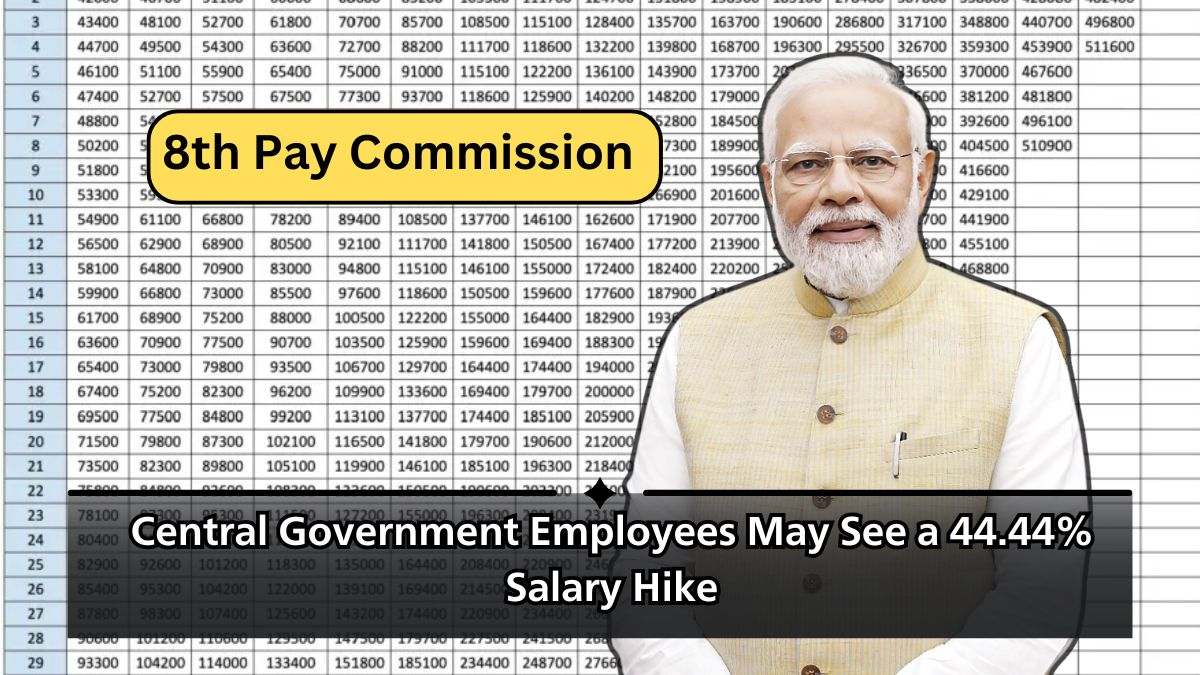8th Pay Commission Good News: The Fitment Factor, a key parameter used to revise salaries and pensions, is at the center of discussions. Under the 7th Pay Commission, the Fitment Factor was set at 2.57, resulting in a significant rise in the minimum salary from ₹7,000 to ₹17,990. With the approval for the formation of the 8th Pay Commission, employees are eagerly anticipating even greater benefits when its recommendations come into effect.
A Big Opportunity for Central Government Employees
Prime Minister Narendra Modi has approved the formation of the 8th Pay Commission, a move expected to have significant implications for salary and pension revisions. The recommendations for the 8th Pay Commission are expected by 2026, following the completion of the 7th Pay Commission’s term. Employees are keen to understand how their salaries will change, with particular attention to the Fitment Factor, which serves as the foundation for salary and pension revisions. Given rising inflation, adjustments to the Fitment Factor are considered essential, and the upcoming commission is expected to bring substantial changes, even greater than those seen under the 6th Pay Commission.
What is the Fitment Factor, and Why is It Important?
The Fitment Factor is the multiplier used to calculate salary and pension revisions. Under the 7th Pay Commission, the Fitment Factor was set at 2.57, raising the minimum salary from ₹7,000 to ₹17,990. It remains to be seen what the Fitment Factor will be under the 8th Pay Commission, but employees and pensioners are optimistic about a higher revision. The commission chairman, whose recommendations will shape the revisions, is expected to present detailed guidelines by 2026.
Salary Revisions Under the 8th Pay Commission
After the implementation of the 7th Pay Commission, central government employees saw one of the smallest salary hikes. The minimum salary was revised to ₹18,000, based on a 2.57 Fitment Factor. If a similar method is followed and a higher Fitment Factor is applied, such as 3.68, the minimum salary under the 8th Pay Commission is expected to increase by 44.44%, reaching ₹26,000.
History of Pay Commission Salary Hikes
4th Pay Commission: Employees saw a salary increase of 27.6%, with the minimum pay set at ₹750.
5th Pay Commission: A significant 31% hike, increasing the minimum salary to ₹2,550 per month.
6th Pay Commission: Introduction of the Fitment Factor at 1.86, leading to a record 54% increase in salaries, with the minimum salary rising to ₹7,000.
7th Pay Commission: Fitment Factor was raised to 2.57, increasing salaries by 14.29%, with the minimum pay revised to ₹18,000.
Expectations for the 8th Pay Commission
If the government maintains the same standards for salary revisions, the Fitment Factor could rise to 3.68, resulting in a 44.44% increase in the minimum salary. Based on this calculation, central government employees’ minimum salary could reach ₹26,000.
When Will the 8th Pay Commission Be Formed?
Currently, the government has only approved the formation of the 8th Pay Commission, as confirmed by Prime Minister Narendra Modi. The approval process involves multiple layers, including formal cabinet discussions and the preparation of a detailed proposal. The composition of the commission, including its chairperson and members, will also be finalized during this phase. While official implementation is anticipated in 2026, central government employees and pensioners are eagerly awaiting further updates.
More like this- Big News for Central Government Employees: Approval for 8th Pay Commission Formation
